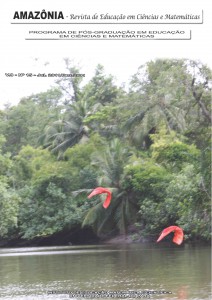Teaching practices epistemologically differentiated about human body learning
DOI:
https://doi.org/10.18542/amazrecm.v8i15.1689Keywords:
science education, teaching models, constructive educationAbstract
How could we teach about THE HUMAN BODY as a different way, in both epistemological and pedagogical approaches? How could we leave behind stagnant as well as stagnating aspects of traditional way of teaching, such as the fragmentation/segmentation of contents, the far away reality, the excessive use of details or else, whenever learning about our own body? These are some of the questions we have considered when trying to escape the bad influence which came from our "environment formation" - putting it on all the marks we have acquired inside or even outside school - trying to overview as meaning our body working...in constant interaction with the surrounding ambient. Among those pointed kind of formation marks we frequently acquire from studying at the University - which need to be transcended —here we come to detach those innumerable contacts with both anatomized and misfigurated supposed human bodies' which didn't even look like actual human bodies, because they could never seem to have sheltered life inside themselves. They were inert as well as static bodies, only used as a such of vain "didactic materials" that could/can permit many teachers on their educational formation to focus a certain teaching approach which only seeks both the students' memorization of an infinitude of "complicated words", and to structure the systems -by several procedures of nouns definition and/or classification - as part of the so called biological organism. In order to do a different way of teaching, we have based our approach on three alternative teaching methodologies which focus these matters under a constructive perspective. On those three focused studies, it is possible to observe that some very principles of a present day teaching approach were there considered to achieve some of them: the respect for the students' previous ideas; the understanding about knowledge as something that is not established for good but as ever changeable and, at last, the constant accessory over the students' re-building of some ideas along the teaching and learning processes in the Science classesReferences
ARAGÃO, R. M. R. de, SCHNETZLER, R. P. e CERRI, Y. L. N. S. (Orgs.) Modelos de Ensino: corpo humano, célula, reações de combustão. Piracicaba – SP: UNIMEP/CAPES/PROIN, 2000.
AUSUBEL, D. P. Educational Psychology : A Cognitive view .New York : Holt, Hinehart & Winston, 1968.
BANET, E. e NÚÑEZ, F. Ideas de los alumnos sobre la Digestión : Aspectos Fisiológicos. Enseñanza de las Ciencias. 7(1), p. 35-44. 1989.
BIZZO, N. Ciências : fácil ou difícil ? São Paulo : Editora Ática, 1998.
BRASIL, MEC. Secretaria do Ensino Fundamental. Parâmetros Curriculares Nacionais : Ciências Naturais. Brasília : MEC/SEF, 1996.
BRASIL, ESTADO DE SÃO PAULO. Secretaria de Estado da Educação. Coordenadoria de Estudos e Normas Pedagógicas. Proposta Curricular para o Ensino de Ciências e Programas de Saúde – 1º Grau. São Paulo : SE/CENP, 1992.
GUIDO, L. F. E. A Evolução Conceptual na Prática Pedagógica do Professor de Ciências das Séries Iniciais. Dissertação de Mestrado. Campinas – SP : Faculdade de Educação – UNICAMP, 1996.
MOHR, A. A Saúde na Escola : análise de livros didáticos de 1ª a 4ª séries. Cadernos de Pesquisa. Nº 94, p. 50-57. São Paulo : Fundação Carlos Chagas, agosto, 1995.
NÚÑEZ, F. e BANET, E. Modelos Conceptuales sobre las Relaciones entre Digestión, Respiración y Circulación. Enseñanza de las Ciencias. 14 (3), p. 261-278, 1996.
OSBORNE, R. e FREYBERG, P. El Aprendizaje de las Ciencias : Implicaciones de la ciencia de los alumnos. Madrid : Narcea S. A. Ediciones, 1988/1989/1990/1991.
RABELLO, S. H. dos S. Histórias de Corpo : a construção do conhecimento na sala de aula. Dissertação de Mestrado. Campinas – SP : Faculdade de Educação – UNICAMP, 2000.
SANTOS, L. H. S. dos. Incorporando outras representações culturais de corpo na sala de aula. In : OLIVEIRA, D. L. de. Ciências nas Salas de Aula. Porto Alegre : Mediação, 1997.



